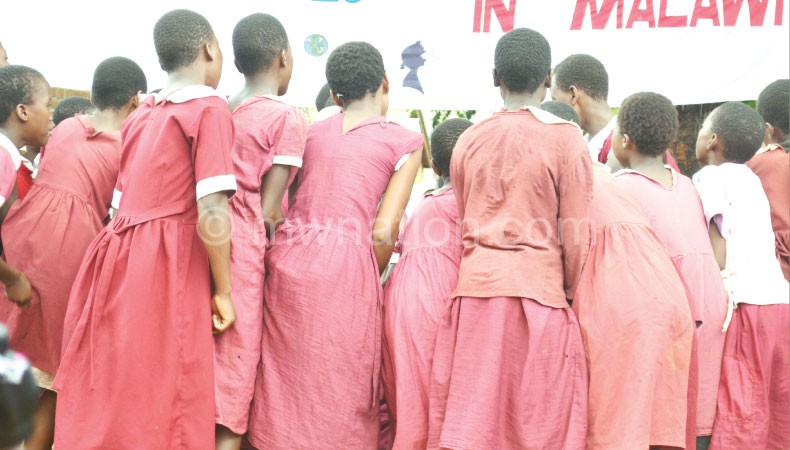South Africa migrants trapping girls into early marriage

Confronting harmful practices is one way of saving girls from early marriages, but some rural communities cite trappings from pockets of Malawians working in South Africa as a silent snare for underage schoolgirls.
In rural parts of Mzimba, boys will remain boys until they go to South Africa, a land of opportunities village head Noah Moyo likens to a goldmine.
But the economic refuge that transforms poor boys into wealthy men is one of the reasons some parents are allowing girls to quit school and marry before reaching their 18th birthday.
This is the story of a girl disguised as Chifundo since she remains only a minor despite surviving the crude side of marrying one of the migrant workers who bring expensive blankets, clothes, cosmetics, phones and other niceties on their way from the continent’s second largest economy.
“The 15-year-old was only in Standard Seven when she disappeared from school four months ago,” says Bwabwa Primary School head teacher Victor Munthali of the poster face of how poverty and culture is contributing to the number of girls in early marriages.
At the time of her disappearance to Chimbongondo, T/A Mtwalo’s area, the girl, a top-10 performer, was a living example that keeping girls in school prevents early marriages and teen pregnancies.
Not until the parents of her Johannesburg-based suitor came calling, saying their son was coming soon and wanted the girl’s hand in marriage.
She says she was lured into marriage because she heard that marriage is a gift that keeps giving, but discovered she had to “work like a slave” for her in-laws’ sake.
During the meeting, the girl, who became the third girl to quit school at Bwabwa this year, was only resuming the life of a laughing stock after the marriage failed just after it started. During the period she relocated to her parents’ in-laws at Chimbongondo, she had never seen her supposed husband.
“Ten girls dropped out of school and three of them married men working in South Africa,” says head teacher Victor Moyo of the school that lost to marriage three girls in 2012 and four last year.
Having escaped early marriage, Chifundo has been in constant talks with a group of women, formed and trained by Creative Centre for Community Mobilisation (Creccom) with funding from Plan International, who have persuaded her to return to school in September.
Corliness Kalua chairs Bwabwa mother group, which is playing a pivotal role to keep children in school and ensures readmission of dropouts.
“In Mzimba, parents have the power to consent to a daughter’s marriage in her absence and the man doesn’t have to be present all the time. The surprising thing is that she was told the prospective husband was coming soon, but she waited in vain for four months until she opted to leave,” said Kalua.
Arranged marriages may be permissible in some cultures, including the Ngoni of Mzimba, but early marriage robs girls of every opportunity to thrive. A human right violation, it denies the schoolgirls their health, education and choice of who and when to marry.
Locals say the harmful practice is common among parents with children working abroad.
“Some go as far as betrothing girls as young as 12, paying the bride price while waiting for their son to come and marry her,” says Kalua.
But the tendency of mistaking girls of school age for brides is not exclusive to Mzimba.
According to the United Nations, 14 million girls are married by their 18th birthday worldwide. As the clock ticks towards the deadline of Millennium Development Goals (MDGs) next year, an under 18 year girl is married every second.
Thirty out of 41 countries with at least 30 percent or more child marriage prevalence are in Africa.
Marrying Too Young, an assessment released by the United Nations Population Fund (UNFPA) last year, shows one out of two women aged 20-24 in Malawi were married before 18, the eighth highest rate of child marriage in the world.
The UN agency’s executive director Babatunde Osotimehin says the situation “urges decision-makers to sharpen their focus on protecting girls’ human rights”.
Being in the top 10 “just shows that as a country we have failed”, according to Grace Mkandawire, executive director of Girls Empowerment Network (Genet) which works in T/A Mtwalo’s area.
This year, Human Rights Watch links high prevalence of child marriage to poverty, teen marriages and weak laws as the country is still using a penal code stipulation which allows girls to marry with parental consent at 15.
But Plan Malawi project manager Blessings Shumba, who works in Mzimba North East locality, adds harmful cultural practices to the list.
“Marriage is not good for girls. They are safer in school. That is why it is commendable to see the mother groups combating cultural practices which are fuelling early marriages and teen marriages in Mzimba,” said Shumba during a training of mother groups.
However, locals in Mzimba say early marriage is not only fuelled by a rush to cash or dowry. Presently, parents get an average of five cows as lobola for their daughters, according to village head Chikwalingwa.
“Both girls and their parents are attracted by the blankets, clothes, cosmetics, bicycles, electronic appliances and other goods the migrant workers’ families get periodically,” says the traditional leader, blaming poverty and low appreciation of how school transforms the lives of girls for early marriage.
Gerald Mkandawire, primary education advisor in T/A Mtwalo, thanks mothers groups for working together with teaching staff, parents-teachers associations and school management committees to ensure children understand the importance of school.
The women visit households and schools to interact with girls, appreciate their challenges and support them to remain in school, he said.
“The girl reclaimed from marriage at Bwabwa and another who was being lured into an exploitative sexual relationship with a shopkeeper at Ezondweni offer living examples of the huge impact the women groups are making,” says Mkandawire.
But poor girls going down the drain due to wealth from the continent’s largest producer of gold is a familiar setback. Like in Mzimba, boys in Nkhata Bay and Mangochi prematurely quit school in preference for South Africa and the opportunities it offers.
The consequences can be ruinous to the girls left behind by the men in the race to the glitter of South Africa.
In Enyezini Zone, Medison Theu is only happy her daughter did not marry at 15 as the Bwabwa example.
In an interview, the parent of eight recounted how her daughter, 22, was abandoned: “Having finished secondary school, she fell in love with a Johannesburg-based boy who used to phone us daily and send us gifts every month.
“When they married, he rented her a house in Mzuzu and left for South Africa. Suddenly, he stopped calling her and sending the money. He did not care how she was surviving.”
Theu has recalled his daughter from Mzuzu and has asked her to repeat Form Four, hoping she will be selected to university.
Meditatively, he sighed: “If the husband could do that to a 22-year-old, what more are his likes doing to girls who marry as early as 15?”
Village head Moyo aptly observes that the abandoned girls are at the high risk of HIV infections.
“On their way from South Africa, they come with expensive phones and we all want our children to go there too. However, their wives start engaging in sexual relationships that expose them to HIV infections due to lack of companionship and basic needs. Unfortunately, the women do not know whether their husbands were faithful or sleeping around while they were away,” said Moyo.





